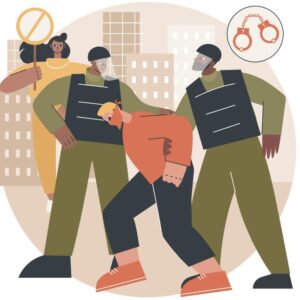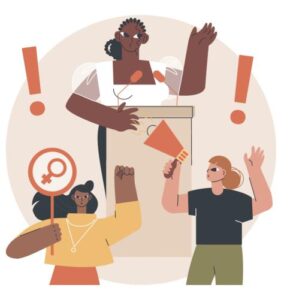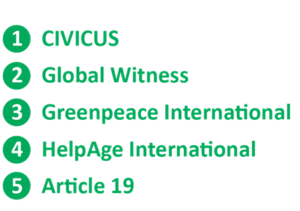Table of Contents
FOREWORD BY SECRETARY GENERAL AND BOARD CHAIR
Over the past year we have witnessed the deepening of regressive trends affecting many aspects of our lives and impacting most drastically on those already the most excluded. Conflicts are raging in several parts of the world, bringing misery for millions. The upsurge of conflict in Israel and the Occupied Palestinian Territories is seeing civilians deliberately targeted and long-established international human rights and humanitarian laws openly flouted, and it’s far from the only example. The escalating climate crisis is producing catastrophic weather events of increasing frequency. Health crises could turn into the next pandemic at any time. Democratic freedoms are under attack in many countries.
 Motivated by a global food, energy and cost of living crisis, people are taking to the streets but are facing increasing repression. Social tensions are being exploited by populist and nationalist forces to sow division, polarisation and roll back human rights. Multiple crises are driving growing numbers of people to flee their homes, turning them into migrants and refugees who are met with institutionalised hostility. Solidarity with them and other excluded groups is increasingly being criminalised.
Motivated by a global food, energy and cost of living crisis, people are taking to the streets but are facing increasing repression. Social tensions are being exploited by populist and nationalist forces to sow division, polarisation and roll back human rights. Multiple crises are driving growing numbers of people to flee their homes, turning them into migrants and refugees who are met with institutionalised hostility. Solidarity with them and other excluded groups is increasingly being criminalised.
We have every reason to despair, and yet we don’t. Civil society’s resilience, optimism and capacity to act in the face of adversity gives us reason to hope.
 As shown in our 2023 State of Civil Society Report, civil society has continued to mobilise at every level and in every available arena. It has employed an increasingly wide array of tactics and forged diverse partnerships and alliances to demand democracy, inclusion and climate justice. It has urged reforms of global governance institutions to put them at the service of the rights of the many rather than the privileges of a few.
As shown in our 2023 State of Civil Society Report, civil society has continued to mobilise at every level and in every available arena. It has employed an increasingly wide array of tactics and forged diverse partnerships and alliances to demand democracy, inclusion and climate justice. It has urged reforms of global governance institutions to put them at the service of the rights of the many rather than the privileges of a few.
Over the past year, we have documented the challenges civil society faces and the victories it continues to achieve. The CIVICUS Monitor has identified hotspots, clusters of restrictions and repressive tactics, and sounded the alarm through country reports and policy briefs. Its Watchlist, highlighting sudden and severe setbacks in respect for civic space, has guided targeted advocacy efforts. CIVICUS Lens has documented civil society action based on firsthand accounts from people on the frontlines of change. We have passed the mic to those most affected by the major issues of the day and helped them share learnings and find common ground across diverse struggles for rights.
 We have been no passive observers but rather active supporters of civil society’s struggles. We have done this through a combination of advocacy, networking and solidarity, with priority given to groups affected by the combined impact of civic space restrictions and structural discrimination.
We have been no passive observers but rather active supporters of civil society’s struggles. We have done this through a combination of advocacy, networking and solidarity, with priority given to groups affected by the combined impact of civic space restrictions and structural discrimination.
At the United Nations (UN) in Geneva and in New York, we have both participated in high-level discussions, bringing in the perspectives of global south civil society, and supported grassroots activists to come and speak for themselves.
When protests at rising prices of essential goods and services took place in repressive contexts, violent repression followed. In response, much of our work has focused on defending freedom of peaceful assembly (FoPA), including by supporting protesters through much-needed financial and non- financial emergency help.
As clampdowns on civic space tightened, we stood in solidarity with people fighting back, including through our #StandAsMyWitness campaign, which profiles imprisoned civil society leaders and calls for their release. Over the past year, 15 profiled human rights defenders (HRDs) were acquitted or freed.
Our Strengthening Central America Civil Society Initiative supported CSOs working in severely restricted civic space. And to further enable civil society worldwide, we launched two new actions targeted at local global south civil society groups, especially from marginalised communities: the Digital Democracy Initiative (DDI), aimed at supporting their effective use of digital technologies to strengthen civic space and inclusive democracy, and Local Leadership Labs (LLL), supporting inclusive spaces for local civil society alongside decision-makers to drive context appropriate policies and solutions. We turned our attention to the young activists who are rapidly changing the face of civil society, pushing the boundaries and challenging assumptions about what civil society is, what it looks like and how it works. Young activists are reinvigorating social movements and creating new structures of participation, embracing creative tactics and new technologies. They practice intersectionality in their everyday organising, with young women increasingly in the lead and people from excluded groups asserting the value of their knowledge and perspectives. They are powering movements for climate action, racial justice and gender equity. They are challenging preconceptions, and the backlash they are experiencing is proof of their impact: they are shaking the system, and the guardians of the system are responding in full force.


To help young activists gather the support they need to continue their vital work, we produced a Youth Playbook offering tools and recommendations for potential funders and allies. We supported a team of young researchers to work with CIVICUS’s Youth Action Team to deepen understanding of the trajectories, challenges and learnings of global south youth activists. We aim to turn this research into further advocacy tools.
The Grassroots Solidarity Revolution Campaign promoted locally led public deliberations and context-relevant analyses in a range of languages and locations. The initiative included online and in person Jam Sessions created by and for activists to address issues of personal and collective wellbeing, resourcing and organising. We supported global south activists to share their experiences through video to humanise their work and make it easier to reach out to donors.
We supported seven partners through our Solidarity Fund, which we made more accessible by reducing barriers in the application process. We published an updated and expanded edition of the Donor Finder, targeted at smaller, less formal local groups, along with a new Rapid Response Donor Finder to improve responses to crises, emergencies and attacks and help mitigate threats.
Our first Membership Engagement Month provided multiple training and networking opportunities for our expanding membership. More than 3,000 of our members engaged with us over the year.
Together we became stronger.
We are committed to leading by example. Internally, we are in the process of implementing a racial justice plan and have already changed our hiring guidelines. We earned the top spot in the Fair Share of Women Leaders Monitor, which measures the proportion of women on staff and in leadership positions. As an active member of Accountable Now, a global platform that works with civil society organisations (CSOs) to improve transparency and accountability, we have continued to report on our internal and external practices.
Collectively, we are experiencing the biggest setback for democracy and human rights in decades. But we are many and, when working together, we are powerful. We believe that another world is possible and standing alongside each other gives us the courage to strive for as long as it takes to make that better world a reality.

Dylan Matthews
Board Chair of CIVICUS
Chief Executive Officer at Peace Direct

Lysa John
Secretary General of CIVICUS